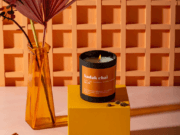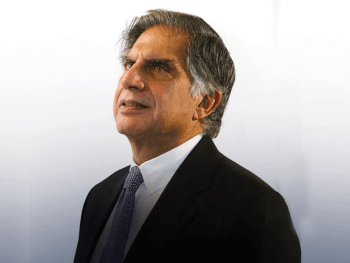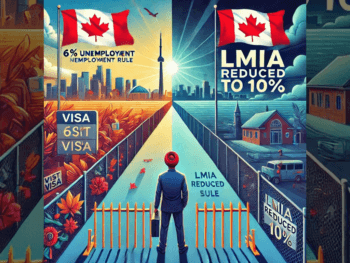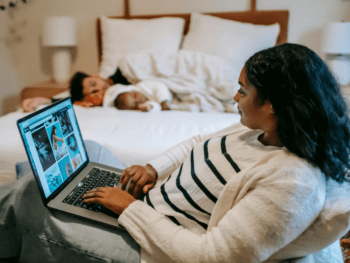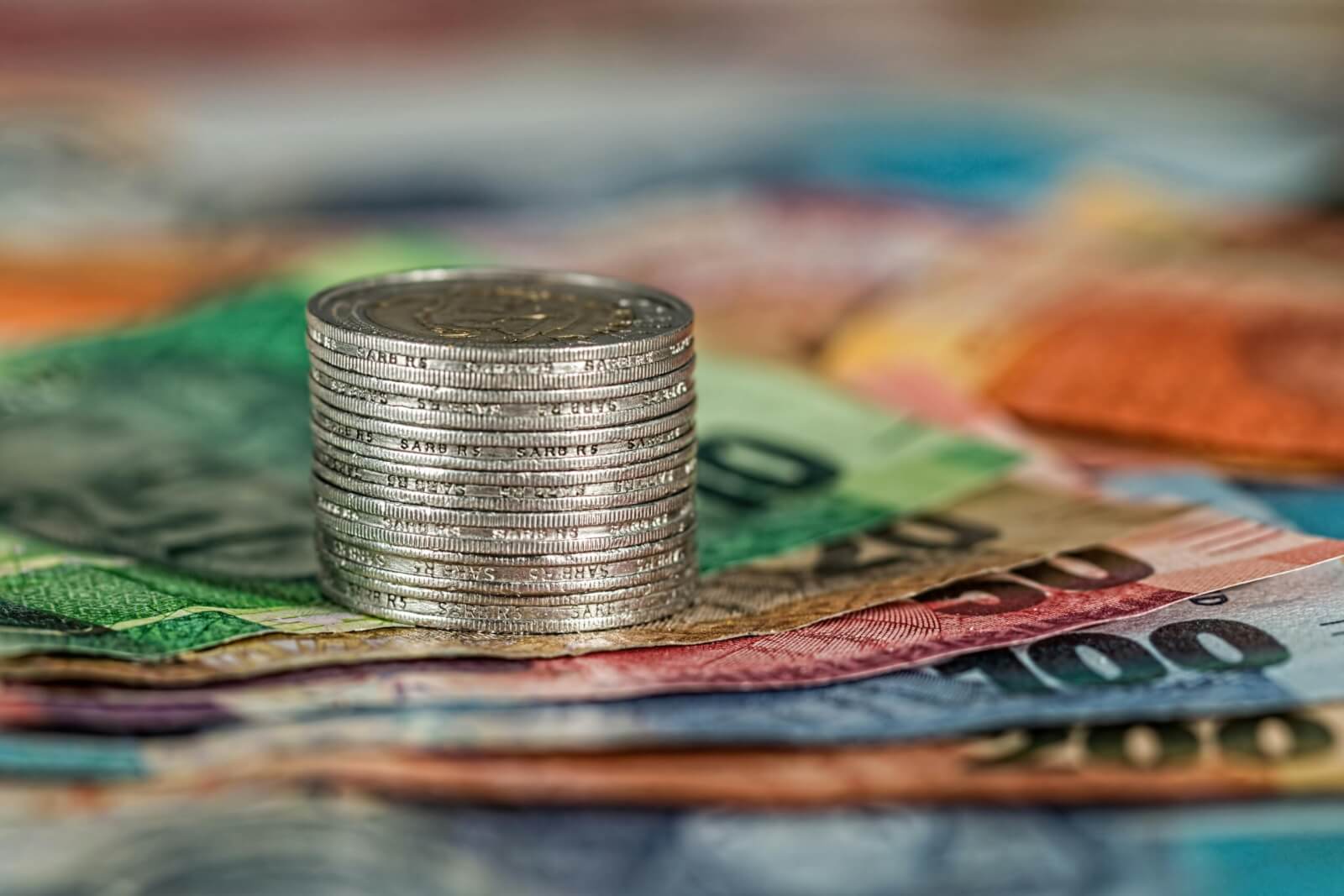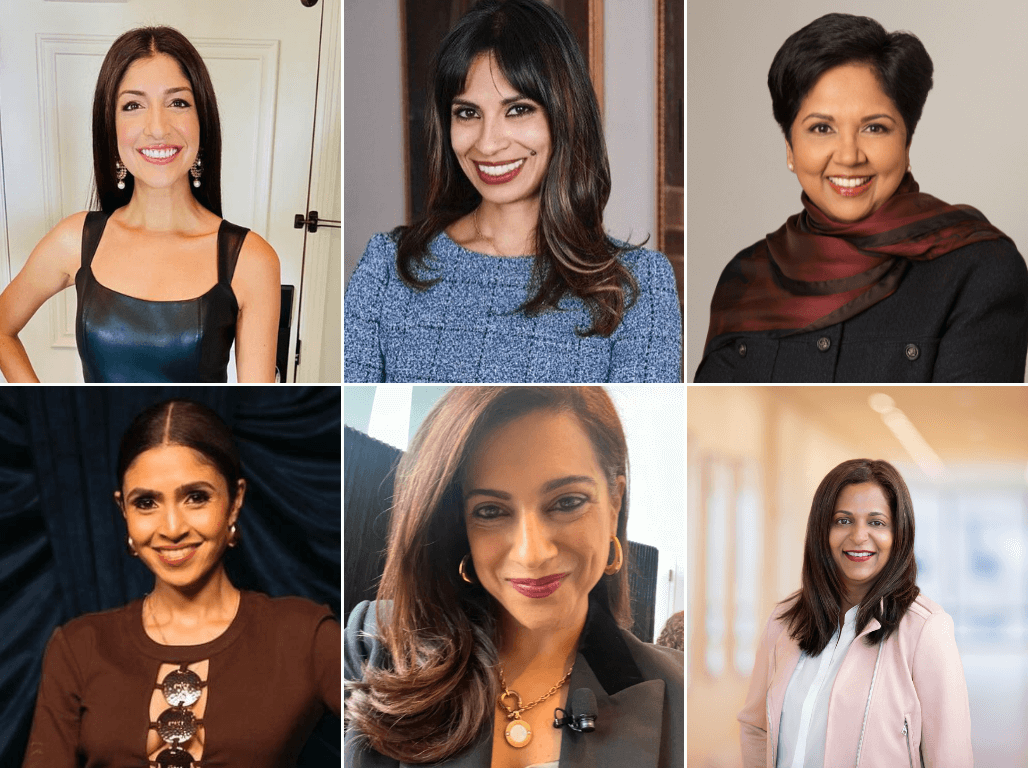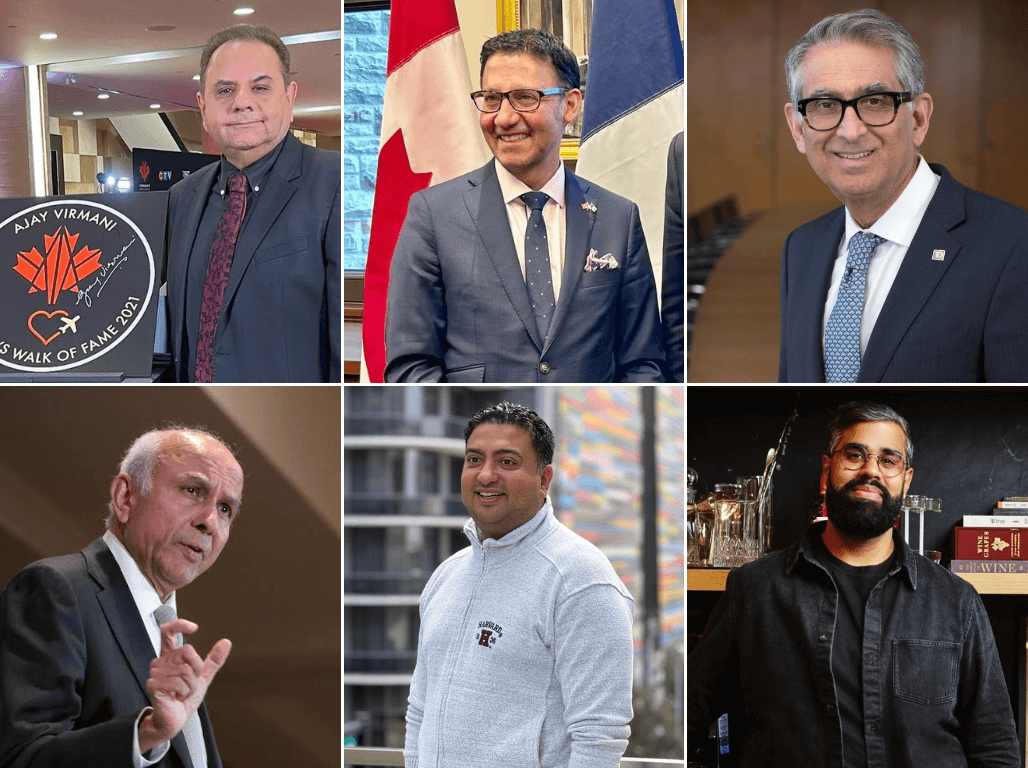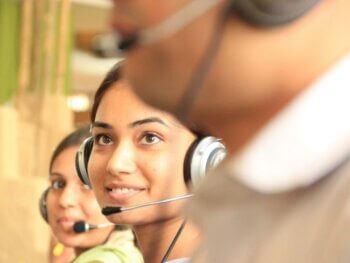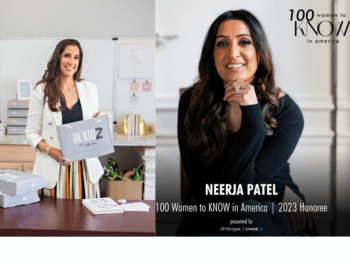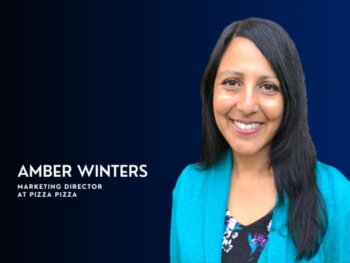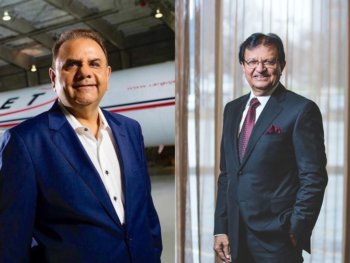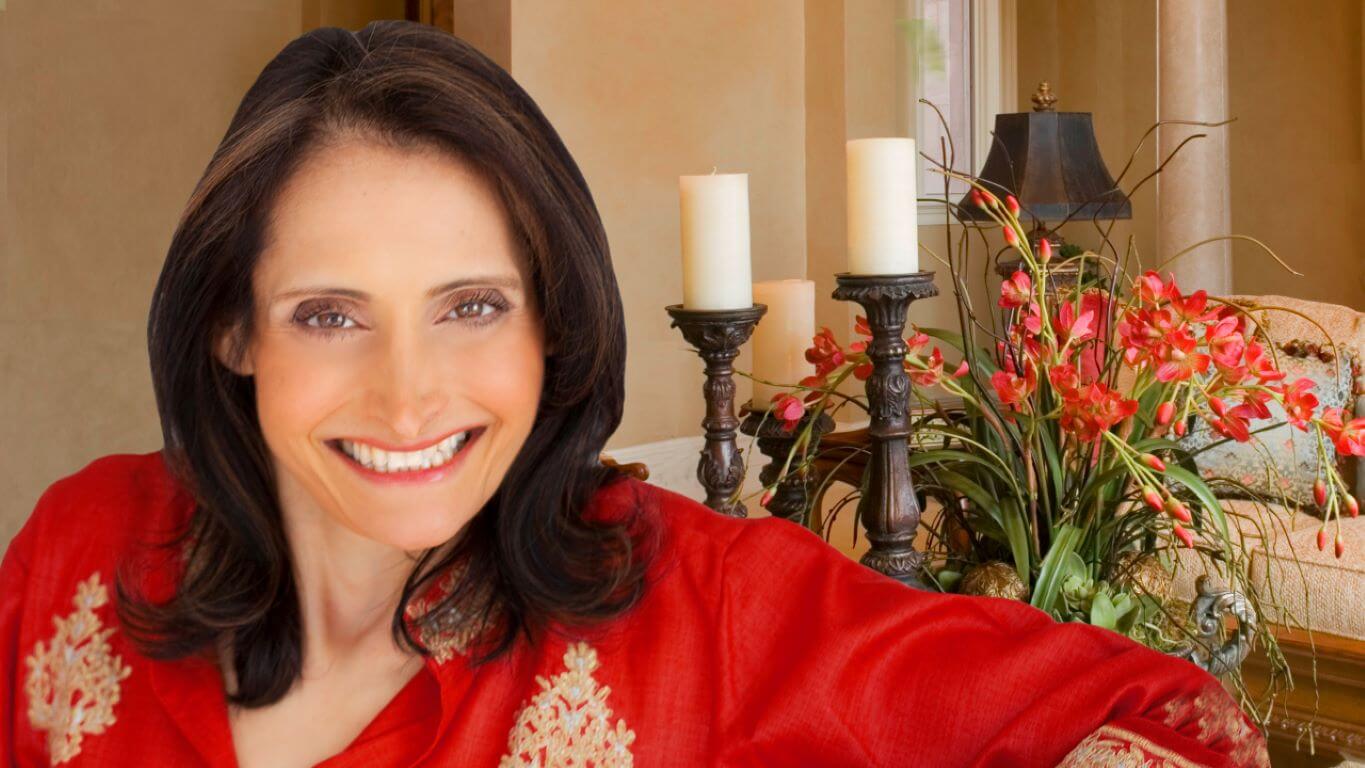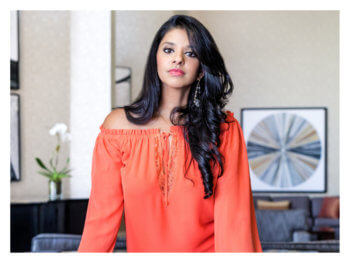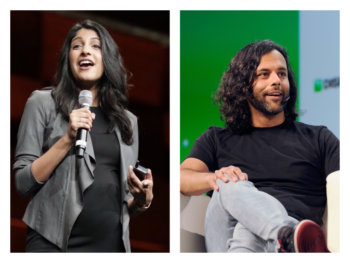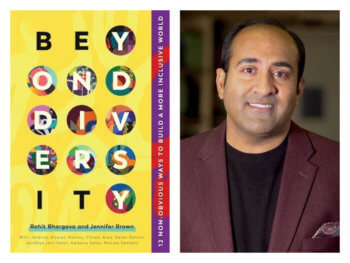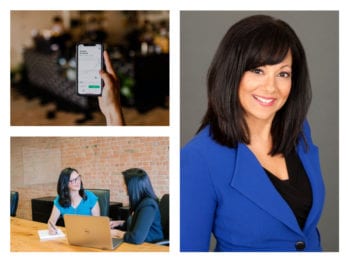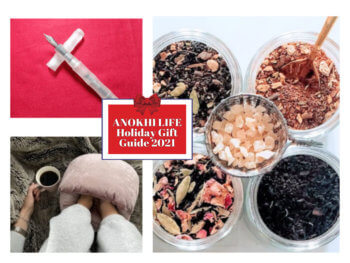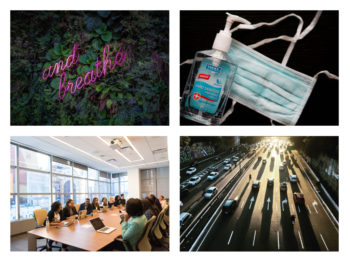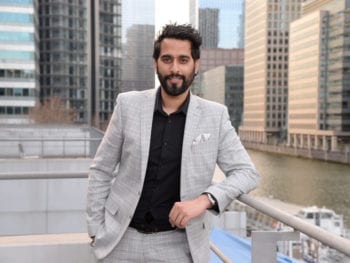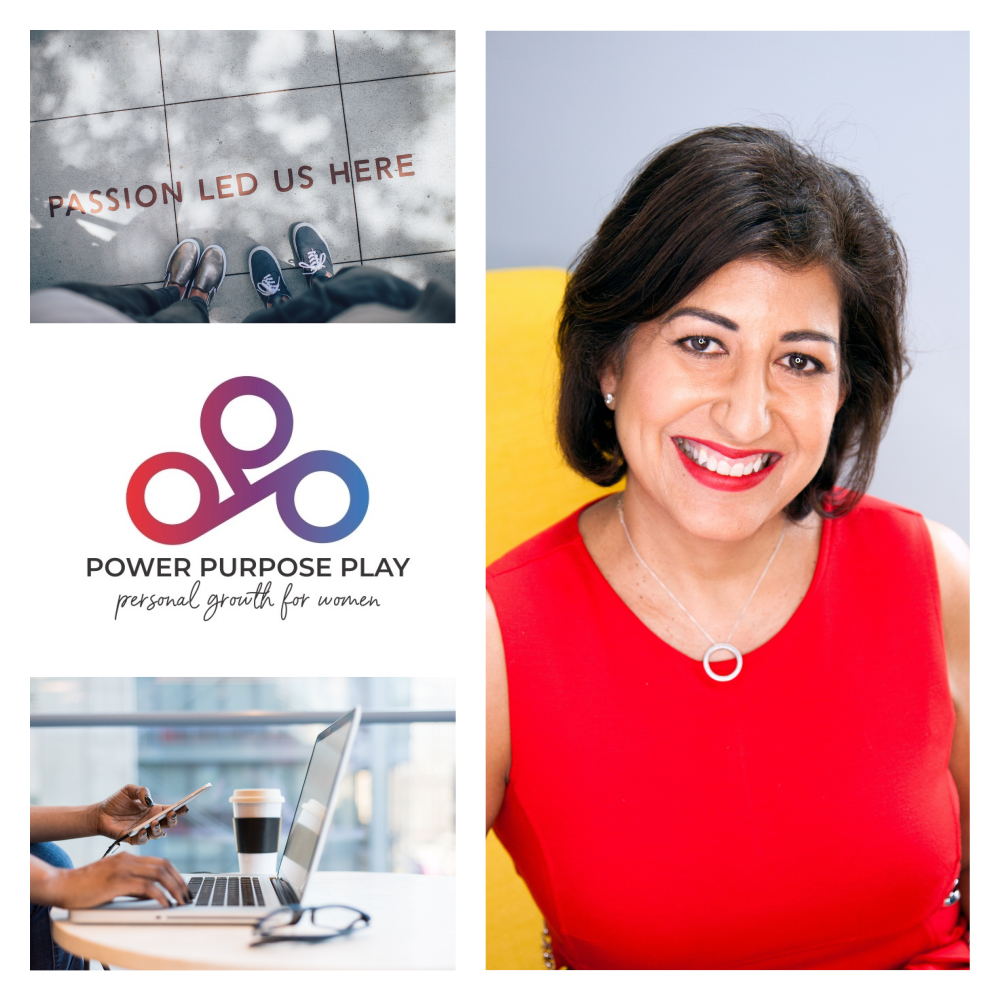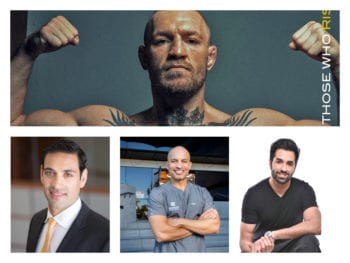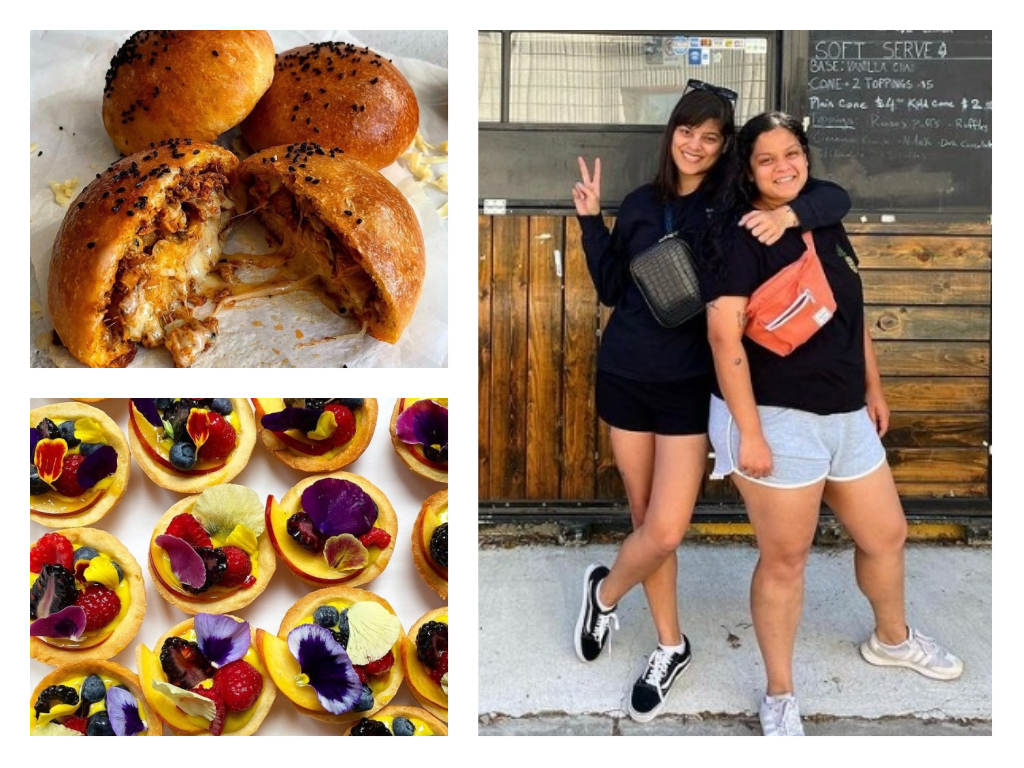
Two Sisters Tell Us How They Went From Social To A Store With Little Sister Baking
Business Oct 01, 2021
Entering the food business is always a risky choice. Especially during such economically trying times. However Akash Swar a Cordon Bleu-trained pastry chef, decided to satisfy her cravings for Mumbai street food by giving it a twist: she married her training in European baking with her favourite South Asian ingredients. From posting her freshly baked treats on Instagram, requests started pouring in. Her sister Tanvi an advertising executive, decided to take full advantage of this social traction and last summer launched Little Sister Baking. Akash and Tanvi share their journey from their social posts to opening their first storefront in Toronto.
Sisters Akash 27 and Tanvi 32 took similar creative roads when it comes to their careers. Akash came to Canada from India to study Culinary Arts at Humber College. She decided to shift to pastry and graduated with honours from Le Cordon Bleu. Tanvi an advertising executive, graduated with honours from York University majoring in Communication Arts. She also added a diploma in Advertising from Seneca Collage to her portfolio. I chatted with them to get a full feel on their incredible culinary journey that they both embarked on.
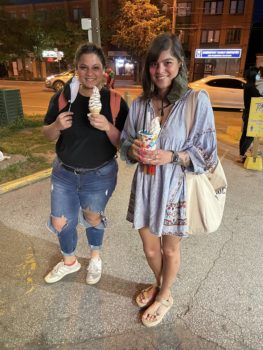
Hina P. Ansari: Congrats to you both! Let’s start with you Akash: You are a Cordon Bleu-trained pastry chef, having worked at notable restaurants including Bucaand Auberge du Pommier. What drew you to the culinary world.
Akash Swar: I’ve always had a passion for cooking. Growing up, my sister was the one who did the eating and she learned to cook out of necessity, but I’ve been the one in the kitchen with my mum helping out with cooking. I’ve always enjoyed working with my hands and creating something tangible that people can have an immediate reaction to. In addition to that, my entire family cooks very well and we are all about food so when I realized it was an option for me I couldn’t do anything else.
HPA: Akash, you create unique pastries by marrying the European culture of baking with South Asian flavours. How did that come about?
AS: There’s actually a huge baking culture in South Asia. Most North Americans don’t know this but English, Dutch and Portuguese colonization left behind a huge baking culture in South Asia. There are bakeries everywhere and we have our own versions of bread, cookies, biscuits, cakes, pastries and more. In fact one of our favourite cookies is the Shrewsberry biscuit that is basically a buttery shortbread biscuit made in a small town in India, called Pune. The baked goods we make aren’t actually new to South Asians – they’re called different things back home, but the items are basically the same. Our meat and veggie stuffed puffs are a staple in bakeries all over India, but they’re more commonly called Patties. We called them Puffs to differentiate ourselves from the huge culture of Jamaican Patties in Toronto. The buns are also popular, often found behind
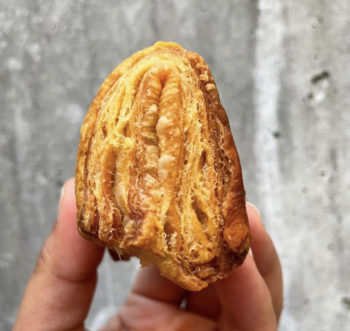
HPA: Tanvi, how did you parlay your advertising experience to your business?
TS: I work at an advertising agency in Toronto, we make commercials and ads for some very iconic brands. I do a lot of research and strategy – which involves understanding the consumer.
The first thing I learned about in advertising was to listen to your consumer. I spend hours every day trying to convince my clients to listen to their consumers and educate them on what their audience wants while also balancing their priorities – since I am my own client in this case, my philosophy is always to listen to the consumer first. Without our consumers, we’re nothing. We have a really loyal group of consumers and we respect them by listening to what they want and need. We are constantly evolving our brand, our food, our menus, even our delivery options based on what our consumers are saying.
HPA: You both were pursuing your respective careers and then the pandemic hit. How did that change your lives?
TS: I have worked non-stop for the past 10 years without a break longer than 2-3 weeks at a time. When I got laid off due to the pandemic it was almost a bit of a welcome change. I had never gotten 2 full months off work, so it gave me a chance to get back to my passions like painting, cooking and reading. It made me realize how important it was to pursue your passions alongside work. Balance has become extremely important to me now.
AS: I had just come off a year of studying at Le Cordon Bleu and was really inspired and energized to learn and bake a lot. I had plans of going to England and travel across Europe cooking and baking, but the pandemic put a complete stop to that. It also made me realize that a lot of chefs expected underpaid line cooks and pastry cooks to basically put their lives on the line for the same level of pay and benefits in the middle of a global pandemic – it made owning my own business look appealing even with all the hard work and long hours that go into it.
HPA: When was the idea of creating a baking company come about? And the name of your business, means that Akash you are the “little sister” correct?
TS: When I got laid off, Akash and I were cooking a ton. We were experimenting with food that we missed from home (at that point we hadn’t been home in 2 years) and posting about our adventures on social media. One day a friend of ours asked if he could order cookies. We did it as a one off. The next week, Akash tried making pretzels and they were so delicious my husband jokingly said we should sell them. That’s where the idea sparked.
AS: Yeah, and when my sister brought up the idea, I was really into it because I had been working in the food industry for many years, underpaid, working long hours in kitchens that were abusive, fat phobic, sexist and more. Getting time off was difficult, I never got a weekend and worked so hard my health was being affected. It was tiring and I was just over it. The idea of owning my own business sounded amazing to me because I knew I would be able to control my own time off, how much I worked and pocket all the profits myself instead of being underpaid. And yep – I’m the little sister, haha.
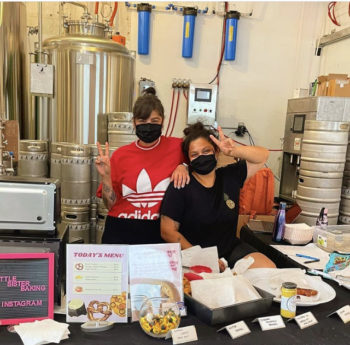
HPA: When did Little Sister Baking officially launch?
TS & AS: We soft-launched to family and friends around July of 2020, but officially launched to the public in a commercial kitchen in January 2021.
HPA: Food is such an important element of our culture. Tell me about your relationship with food.
TS & AS: I always say we don’t have the concept of “foodies” back home, because every single person is a “foodie” – all however many billion of us are obsessed with food. Like most South Asian families, food in our family is a love language. We use it to celebrate, to show love, to show care and comfort. When I go home, it doesn’t feel like home unless my mom makes me a very specific welcome meal, it doesn’t feel like I’m home until there’s a Sunday seafood dinner with my family or Christmas at my best friend’s house without her famous Pavlova or Trifle. We grew up with a mom who made everything from scratch, who was incredible at cooking – everything she made was delicious, not a single thing my mom makes is bad. She’s always complimented on her food, so we grew up with a very refined palate. Food is the central theme of my life. I basically only read non-fiction books about food – food history, food and culture, food and travel. I study it in my free time because it interests me so much beyond just eating it – same with Akash.
HPA: What was your family/friends’ reaction when you both decided to embark on this entrepreneurial journey?
TS & AS: They were happy for us! My mom especially has always wanted us to be entrepreneurial and we’ve never been interested until LSB, so she’s very proud and happy. I’ve been able to reconnect with a lot of old friends who found our business and didn’t realize who was behind it until they saw my face all over our Instagram stories haha.
HPA: Akash, I assumed you started baking in your kitchen?
AS: I did when we soft launched to family and friends only but in January we didn’t launch until we had a commercial kitchen that we felt good about.
HPA: Tell me about how you used Instagram to showcase your offerings?
AS: It was honestly a little bit organic – we started by posting our cooking adventures and soon people started inquiring about buying the items we posted about and then we simply legitimized it more and more, getting a temporary logo, now a real one. I don’t really have a strategy for posting and showcasing our items. Food is visual and so is Instagram so they are made for each other. We post everything – the good, the bad, the ugly, the mistakes, the setbacks, the trials and tests. It makes customers feel like they are involved, it makes them feel like they are a part of this with you. I spend a lot of time asking peoples’ opinions on flavours and items and showcase the new items we’re thinking about before they are released. I take all the pictures myself, however we are working with a food stylist and photographer for our Diwali menu so they’ll be much better shot. My only rule is to make sure the food is the hero (which is a very basic rule).
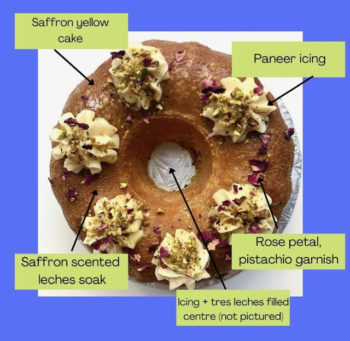
HPA: What are your best-sellers, pastries that you are proud of?
AS: Our best sellers are Chicken puffs, Samosa puffs, Chicken Tikka Buns, Chicken Tikka Pizza Buns, Saag Paneer Buns and of course, our Ras Malai Tres Leches Cake. Our Chaimisu, Chai Buns and Gulab Jamun Cake are catching up to the Ras Malai as well. I’m most proud of our puffs and Gulab Jamun cake. They’re just masterpieces!
HPA: Tell me about your reaction when you received your first order query?
AS: It was probably from a friend so it was probably “Awwww!”
HPA: Starting a company with a family member can be challenging. Tell me about why you two make perfect business partners.
TS: I am the ideas person and Akash can bake basically anything. Akash is very disciplined, and a perfectionist and I am more all over the place. Our contrasting personalities really help us build this business – we couldn’t do it without each other. We’re also very honest with each other and give each other feedback on each other’s work to ensure we’re both doing our best.
HPA: Launching a culinary business can be very tricky. What key aspect do you both feel made your business a success?
TS & AS: I think it’s our authenticity. It’s something that can’t be copied or replicated. The word “authenticity” is thrown around a lot, but we are extremely real about everything – bad days, good days, mistakes. Our business is a reflection of the both of us. We’re two immigrant women, doing this independently, we make mistakes, we’re open and transparent about all the setbacks our business has and I think people relate to that a lot.
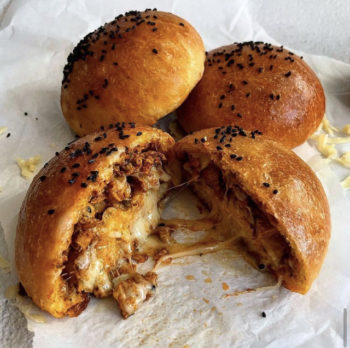
Launching a company during the pandemic could have been a risky move. In hindsight yes, it makes sense but at that time, did you feel that maybe you guys are taking too big of a risk?
TS & AS: I think it was pretty risk-free because we hadn’t invested too much into it and were renting a commercial kitchen so it was quite flexible. I think it felt risky when we got the keys to our physical space, we had to have a sit down conversation and discuss if we were in this and committed long term and we both were.
HPA: What were the hurdles you had to overcome when launching a company during lockdown?
TS & AS: The biggest hurdle was finding a kitchen to work out of and connecting with people, but we were able to use Instagram to overcome the second one.
HPA: Akash, one of the quirky trends that was born from the lockdown was the baking of bread. It seemed that everyone was baking bread. As a pastry chef, you must have found that funny.
AS: Yeah, we actually tried our hand at the sourdough trend too, haha.
HPA: In addition to baking bread, there was also shortage of certain ingredients, i.e.: flour etc. as a result. Did that shortage affect your business at all?
TS & AS: When opened our business the ingredient shortages had basically subsided, however we feel the effects of COVID supply chain issues when we buy packaging. There’s still a supply chain issue globally and sometimes specific items are backordered.
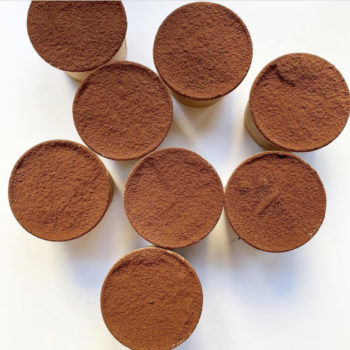
HPA: Did you do any marketing/focus groups etc.? If so, tell me about it. If not, tell me about it.
TS & AS: We did not, but we talk to our consumers on our social media platforms and in person daily and get feedback from them that way. We also keep a close eye on our sales, for example, we noticed our Apple Chaat wasn’t selling well so we simply took it off the menu.
HPA: What was your first 100-day goal?
TS: Entrepreneurs around the world are probably going to face-palm this but we didn’t have any goals, really when we started. We just wanted to make delicious food that we liked and share it with other people. We’ve been taking it one day at a time because both Akash and I have anxiety and can get overwhelmed easily. It’s always one step at a time. Our new goal is to get into wholesale.
HPA: You moved from your home kitchen to a commercial kitchen and now have opened your stand-alone store. Tell me about that journey?
TS: We only worked in our home kitchen when selling to friends and family in 2020. When we closed in December 2020 our goal was to reopen in a commercial kitchen. It took weeks of calling various commercial kitchens (which were all closed because of COVID or too expensive) and finally found the perfect one at Scadding Court Community Center. We worked there until July. SCCC manages Market 707, a shipping container market that is specifically rented out to BIPOC entrepreneurs. They had a space open up in August and we jumped at the opportunity. Since then, we’ve been slowly renovating and updating the space for LSB. We don’t have any capital or any huge amounts of savings for the business so we have had to do one thing at a time. Appliances and prep table were first, and now we’ll move onto the marketing materials.
HPA: Was there anything you realized you didn’t need when building your business?
TS: Huge investments and big, scary investors and a huge space.
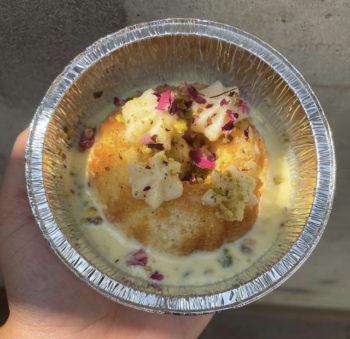
HPA: What was the most surprising thing you have discovered when building your business during these times?
TS: I’m still surprised every day that people want to eat our food, crave it, want it at their events, weddings, etc. Jokes aside, I think I have heard so much about the food industry being cut-throat that I started off cautiously, but it was nice to discover a whole community of supportive small business owners who are willing to help each other.
HPA: If you take a look at the overall scenario closely, do you think your business launched successfully as it did because of the pandemic?
TS: I do think so – people were spending a lot of time online and the only thing we could do was eat, especially during the winter lockdown. It definitely helped us get on the radar and in front of people. Before the pandemic, opening our own food business seemed inaccessible with expensive rent and big capitals. But the pandemic made people more comfortable with pick up models and rental kitchens and it actually made this business accessible to us. It allowed us to start small and slow and keep growing from there rather than requiring a huge capital as typically is needed.
HPA: What was the consumer feedback?
TS: People love our food, a lot of people with a similar background as us say it takes them back to their childhood, that it’s nostalgic and comforting. A lot of people who didn’t grow up with these flavours are loving exploring a new side of South Asian food that most people didn’t know about. People have been nothing but kind, loving, friendly, accepting and even helpful! And more recently – patient with us. We love our customers so much, we’ve made so many friends through this business that we are so grateful for.
HPA: What is Little Sister Baking’s next plan?
TS: We want to get into doing wholesale for a few key places and keep expanding. We want more people to try our food and know that South Asian food isn’t just butter chicken!
HPA: What advice would you give to entrepreneurs who are also looking to carve their own space in this world, during this time?
TS: Be yourself, trust your instincts and stay honest. I find that a lot of people pay too much attention to what other people are doing and end up not being as great as they could be. Do what’s true to yourself, trust yourself to make the right decisions and be honest about where you are at and what you’re about.
You can check out all their wonderful good on their Instagram page, and visit their store at Market 707 at 707 Dundas West, Toronto.
Main Image Photo Credit: Little Sister Baking
Hina P. Ansari
Author
Hina P. Ansari is a graduate from The University of Western Ontario (London, Ontario). Since then she has carved a successful career in Canada's national fashion-publishing world as the Entertainment/Photo Editor at FLARE Magazine, Canada's national fashion magazine. She was the first South Asian in...











